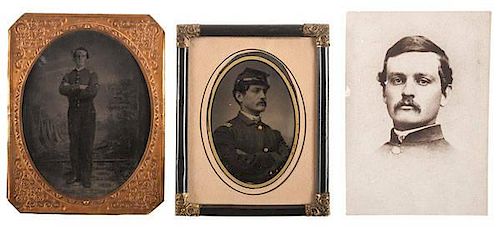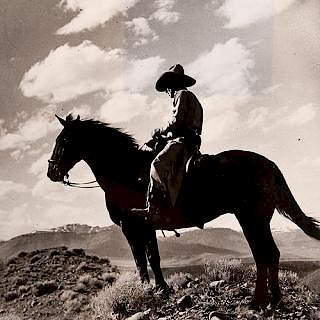Albert H.C. Jewett, 4th New Hampshire Infantry, Archive Including Photographs, Documents, & Family Correspondence
About Seller
6270 Este Ave.
Cincinnati , OH 45232
United States
With offices in Cincinnati, Cleveland and Denver, Cowan’s holds over 40 auctions each year, with annual sales exceeding $16M. We reach buyers around the globe, and take pride in our reputation for integrity, customer service and great results. A full-service house, Cowan’s Auctions specializes in Am...Read more
Two ways to bid:
- Leave a max absentee bid and the platform will bid on your behalf up to your maximum bid during the live auction.
- Bid live during the auction and your bids will be submitted real-time to the auctioneer.
Bid Increments
| Price | Bid Increment |
|---|---|
| $0 | $25 |
| $500 | $50 |
| $1,000 | $100 |
| $2,000 | $250 |
| $5,000 | $500 |
| $10,000 | $1,000 |
| $20,000 | $2,500 |
| $50,000 | $5,000 |
| $100,000 | $10,000 |
About Auction
Jun 12, 2015 - Jun 13, 2015
Cowan's Auctions dawnie@cowans.com
- Lot Description
An archive of 50+ items regarding Albert Henry Clay Jewett and his family, ca 1861-turn of the 20th century. The collection is comprised of the following: 18 photographs, including 2 Civil War-period tintypes, half plate and quarter plate, featuring Jewett in uniform, a 4 x 5.5 in. copy print of Jewett after a war-date portrait, and 3 photographs of Jewett later in life, plus various family photographs; approx. 30 letters and documents, including Jewett’s commissions for promotion to second lieutenant and first lieutenant with the New Hampshire 4th Infantry, post-Civil War correspondence between Jewett and his daughter, Grace Jewett Austin, a letter from the New Hampshire Adjutant General on the revolutionary service of his grandfathers, Samuel Jewett and Benjamin Glines, and several other “official” documents regarding his personal affairs, death and estate; and 2 copies of Jewett’s book A Boy Goes To War, written in 1898 and published by his daughter Grace in 1944 (one copy signed by Grace).
A. Henry Jewett was born on December 22, 1841, at Laconia, NH, into a prominent New England family. At the age of 19, he enlisted in the New Hampshire 4th Infantry as a sergeant for three years of service. He was mustered in September 18, 1861, to “D” Company. During the war, he was promoted to 2nd lieutenant on November 5, 1862, and to 1st lieutenant on March 14, 1863. Just before the end of his enlistment term, he suffered heat stroke during the Battle of Deep Bottom in the Petersburg Campaign. He was mustered out of service September 26, 1864, after being discharged from the military hospital. He returned to New Hampshire, finished his education, and married Marietta Merrill in June of 1868. Dr. Jewett practiced dentistry in Laconia until the family moved to Washington, DC. There he worked for the Pension Department at the Department of the Interior. The Jewetts had two children, Grace and Henry. He died December 14, 1898 in Washington, DC, at the early age of 56.
The New Hampshire 4th infantry was organized in Manchester, and mustered in for a three-year enlistment, September 18, 1861. Before mustering out on August 23, 1865, the 4th New Hampshire saw duty in South Carolina and Florida throughout much of the War but moved on to Bermuda Hundred, Cold Harbor, and Petersburg in 1864. The regiment lost a total of 234 men during service.
In his book, Jewett writes of his last action at Deep Bottom:…a soldier came running up to me [and said] "Do you see those men marching past our flank? Well those are rebels"…I at once went to Brig. Gen D.B. Birney …and advised him of the fact. "Never mind" he replied, "Forward" and away we went to the front. Soon we were met with scorching fire not only from our front but an "enfilading" fire…When Lieutenant Col. Parker saw this he gave orders for a change of front at the same time being seriously wounded in the neck. I became practically unconscious and only learned later [that]…my case was diagnosed as a partial "sunstroke"…the next day I woke to find myself lying on the ground covered with blankets, the rain falling on my gently face. A few feet distant I recognized the remains of Lieutenant Colonel Henderson…and I think Lieutenant Colonel Plimpton…Both these men were very fine and accomplished officers and the State of New Hampshire lost many other gallant officers and men in this unfortunate affair.
Of Grant, Jewett writes in the published book; I observed his appearance on several occasions and especially noted the lack of pretension in his bearing…He was about forty years of age at this time and rather thin in flesh having a settled look of seriousness on his face and evidently feeling the great responsibility resting upon him. Of General Meade, he writes, …[He] had the appearance of a wearied and broken old man, not in good health. He was gray and stoop shouldered and as events proved was not to live long after the close of the terrible struggle.
The archive also contains several photos, documents, and letters between Grace, her husband Frank (Austin) and the Jewett family. Grace was a successful newspaper society section writer/editor for the newspapers in Bloomington, IL. Her column was syndicated by the Western Newspaper Union and distributed in several hundred small town newspapers throughout the country. She was known as “Dame Fashion.” Austin served as society page editor until her semi-retirement in 1940.
The archive provides a useful insight into the lives of two interesting citizens of different generations from the Granite State. - Shipping Info
-
SHIPPING. At the request of the buyer, Cowan's will authorize the shipment of purchased items. Shipments usually occur within two weeks after payment has been received. Shipment is generally made via UPS Ground service. Unless buyer gives special instructions, the shipping method shall be at the sole discretion of Cowan's Auctions, Inc.. Cowan's is in no way responsible for the acts or omissions of independent handlers, packers or shippers of purchased items or for any loss, damage or delay from the packing or shipping of any property.
-
- Buyer's Premium



 EUR
EUR CAD
CAD AUD
AUD GBP
GBP MXN
MXN HKD
HKD CNY
CNY MYR
MYR SEK
SEK SGD
SGD CHF
CHF THB
THB

















